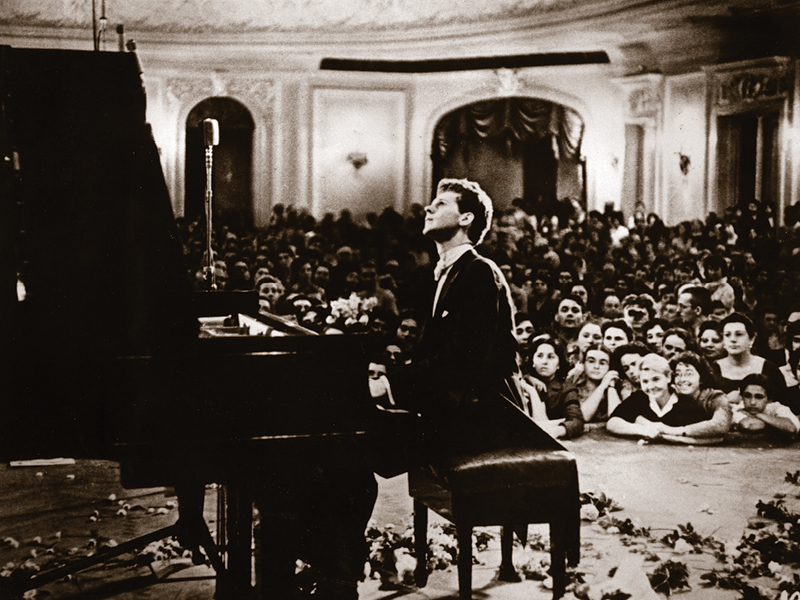By Tom Geddie
Some people’s lives are defined by a single big moment, or at least it seems that way. For Van Cliburn, the biggest moment was back in 1958 when, as a 23-year-old East Texan at the height of the Cold War, he played Tchaikovsky’s “Piano Concerto No. 1” and Rachmaninoff’s “Piano Concerto No. 3” to win the first International Tchaikovsky Piano Competition, an event that some people said was designed to demonstrate Soviet cultural superiority.
That performance earned an eight-minute standing ovation, a tickertape parade in New York City, a cover story in Time magazine naming him “The Texan Who Conquered Russia,” and a long, successful career that included a Grammy award, the first-ever platinum album for a classical recording, and gigs for royalty, heads of state, and every U.S. president from Harry S. Truman to Barack Obama.
There were plenty of other big moments for the Shreveport-born, Kilgore-raised Cliburn.
Jeanne Jordan Johnson chairs the music and dance department at Kilgore College. Back in 1981, 23 years after Cliburn burst onto the international scene, she was relatively new to the faculty and was still a graduate student at what was then North Texas State University. She was singing a solo at the wedding of Annette Morgan, who is now director of financial aid at the college.
“I’m standing at the pulpit at St. Luke Methodist Church singing, and the doors opened in the back of the church and there stood Van Cliburn and his mother,” she said. “It was one of those moments when you say, ‘Oh, my God.’ To survive the next few moments so I could finish the piece as he came down the aisle, I convinced myself that it was not Van Cliburn. Then I went, ‘Oh, gosh, that is Van Cliburn. Then I was terrified.”
Later, the international star asked to meet the young singer.
“He introduced himself like I didn’t know who he was,” Johnson said. “He made me feel special. That’s a special talent, to make everyone around you feel special He asked about my background, my education, who my family was, and seemed very interested in me, and he was always that way with every kind of artist.”
Johnson doesn’t remember what she sang that day, but she remembers the “small” moment vividly. She also believes that quality showed up in Cliburn’s romanticism more than in his considerable technical virtuosity.
“I think there was a certain openness in him that revealed itself in his music,” she said. “He was open to the sensitivity of the composers. He viewed himself as the servant rather than the master, that he was there to do what the composer wanted, and left himself open to that.”
Morgan, a longtime family friend who also took piano lessons from Cliburn’s mother, Rildia Bee O’Bryan Cliburn, reminisced that Cliburn “was so humble about it all.”
“She was such an encouragement to him,” Morgan said. “She was so proud of the generous man that he became, and also how humble he was despite his success.”
Cliburn took summer classes at Kilgore College in 1951 and 1952, and later became a benefactor to the college, where the campus includes the Van Cliburn Auditorium.
Cliburn’s whole childhood pointed toward his accomplishments, both at the piano and in the way he dealt with life before he died on February 27, from bone cancer, at his Fort Worth home.
When he was three years old, after he listened to his mother give a lesson to a student named Sammy Talbot, Cliburn crawled up onto the piano stool and played, by ear, the song from that lesson, “Arpeggio Waltz,” written by Caroline Crawford. Cliburn’s mother had trained at the Cincinnati Conservatory and later with Franz Liszt-trained Arthur Friedheim at the New York School of Musical Art, a precursor to the Juilliard School.
Harvey Lavan Cliburn Jr. took daily lessons with his mother until 1951, when, at the age of 17, he went to Juilliard. He won a statewide piano competition when he was 12, and played with the Houston Symphony Orchestra. He made his Carnegie Hall debut when he was 20.
Three years later, after the Moscow triumph, he returned to Carnegie Hall with Kirill Kondrashin, who had led the Moscow Philharmonic in the prize-winning performance. Again, the program included the Rachmaninoff concerto, which RCA Victor released as an album. The next album was the Tchaikovsky concerto, which remained the best-selling classical album for a decade, eventually going triple-platinum.
Cliburn quit performing in 1978, but came out of retirement in 1987 to perform at the White House for President Reagan and Soviet president Mikhail Gorbachev, and then opened the 100th anniversary season of Carnegie Hall. He did a 16-city tour in 1994, followed by a series of recognitions including the Kennedy Center Honors in 2001, the Presidential Medal of Freedom in 2003, the Russian Order of Friendship in 2004, and the National Medal of Arts in 2010.
When he died, he Wall Street Journal called him a cultural hero who “rocketed to unheard-of stardom for a classical musician in the United States.”
The Van Cliburn International Piano Competition, held every four years in Fort Worth since 1962, is scheduled May 24 -June 9 at Bass Performance Hall. It’s recognized as one of the world’s foremost such competitions; 30 of the world’s finest pianists will compete for medals, more than $175,000 in prizes and awards, and three years of commission-free career management valued at more than $1.3 million.
The competition honors Cliburn’s career as much as it does the 1958 triumph that made him, beyond the classical world, as popular as Elvis Presley for a while.
Through it all, he remained, as Johnson put it, a servant.
In one of Cliburn’s last major public appearances, he said at the commencement address at the Cleveland Institute of Music in May 2012 that musicians are missionaries for music, who devote themselves to a higher power.
In 1958, after his international triumph in Moscow, he said much the same thing: “I’m only a witness and a messenger. Because I believe so much in the beauty, the construction, the architecture invisible, the importance for all generations, for young people to come that it will help their minds, develop their attitudes, and give them values.”
All of these – the small moments as well as the big — add up to define the individual who said music “is like breathing, like nourishment.”


